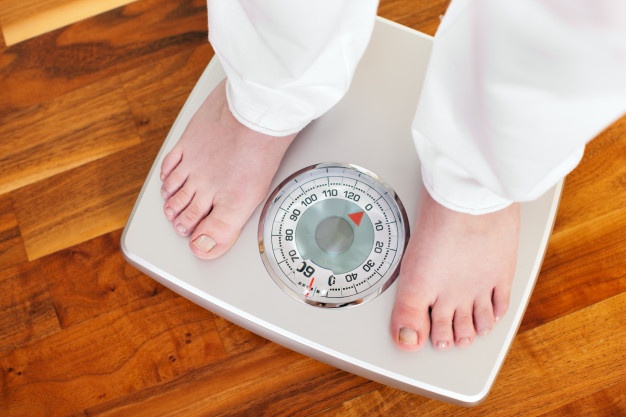A common question I get when a client is trying to lose weight is “how often do I weigh myself?” Do I weigh myself daily, weekly, monthly, or at all? The scale is a very quick and easy way to help us see visually where we are at with our weight.
Making the decision to get on the scale can result in one of two possible outcomes:
- You get on the scale and you are happy with your weight
- You get on the scale and you are UNhappy with your weight
For me, if I am happy with the number staring back at me, I have a feeling of vindication that my daily sacrifices were well worth it, they paid off this time even if I had a few meals that were kind of hairy. Often, I feel like I have some form of control over the little decisions I made along the way to help me achieve that number. On the other hand, if I get on the scale and I have maintained or even gained weight, the number may scare me enough to help me get back on track. This is especially true when I have eaten a lot more than I was actually hungry for. Makes sense right? Where the scale gets a little hairy for me personally, is when I know I have had a week of feeling in control of my food choices and I am super excited to get onto the scale expecting that number to drop to a weight that makes me feel like my hard work has paid off. I have painstakingly planned my meals and eaten exactly how I desired, drank enough water, exercised and am feeling super confident that the scale will surely reward me with a number less than my last weight. Then, the number gazing back at me is the same or even higher than my last weigh-in. Ugh. How is that number possible? I feel defeated and question why my goal number did not happen. Did I not work hard enough? I feel frustrated that my effort did not reward me with success on the scale. I end up reviewing my week in my head trying to figure out exactly what I did to make that number happen. And if I come up with nothing, I have to make the decision to either keep progressing forward or take a moment to review why I am doing this in the first place.
So what do you do?
In truth, you could be doing everything necessary to lose weight but the scale may not budge due to factors that may be out of your control. Your body is filled with daily variables that may increase the number on the scale not related to actual weight gain. This could be due to eating a high salt meal, fluid status, dehydration, physical activity, or fluctuating hormonal levels. The scale is not able to differentiate between muscle mass, fat mass, and fluid so it hard to know what is the actual cause of the weight gain is.
So what is the magic number?
Research studies support the notion that weighing regularly helps participants lose weight. This could be daily or weekly, whichever works for you. How much you weigh yourself may depend on what stage of the game you are in with your weight loss journey. If you are actively trying to lose weight, having some form of consistent feedback may help keep you focused on your goals at hand. For those who have already lost weight and are trying to keep it off, weekly weigh–ins may be helpful to achieve this goal. The National Weight Control registry has followed the patterns of 10,000 individuals who have achieved long-term weight loss maintenance and kept it off for an average of 5.5 years. Of these participants, 75% reported weighing themselves at least one time per week.
The scale, however, is not the only way to determine success with weight loss. Trying on clothes in a smaller size, using a tape measure to gauge body circumference measurements, as well as keeping track of your daily successes, are other ways to keep yourself accountable to your goals. The scale can be used as a tool that, when used with other tools, can help keep you accountable to your desired goal. If you are practicing the healthy behaviors every day to lose weight, then the number on the scale will not be able to measure your progress.
You know which approach works best for you. However often you choose to weigh yourself, or not weigh yourself, is the right decision for you. Know which way will allow you to stay consistent and motivated in this difficult journey. Making a commitment to yourself every single day to work on the behavior changes need to lose weight will eventually get the scale going in the right direction, however often you choose to do it.
The takeaway when deciding if you should weigh yourself:
- If you are trying to lose weight, weighing yourself daily or weekly may be helpful to see if you are staying on track with your goals
- If you are trying to lose weight, and the scale sabotages or acts as a trigger for you, then DON’T weigh yourself. Try other ways to measure progress such as trying on smaller fitting clothes or keeping track of your daily successes
- Look at your weight loss in terms of how much you lost in a one month increment rather than weekly
- If you are trying to maintain your weight, weekly weigh-ins may help you keep the weight off

